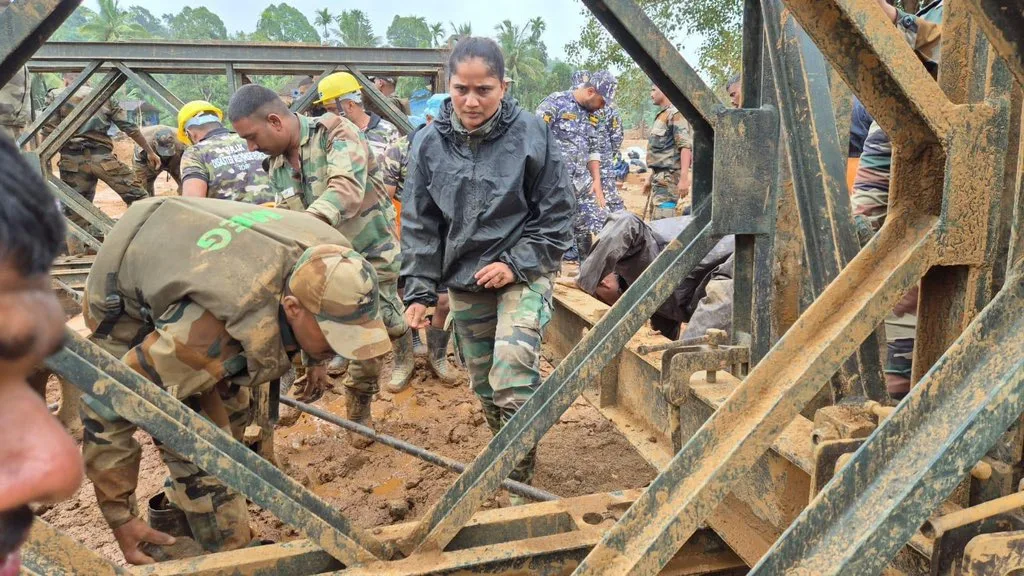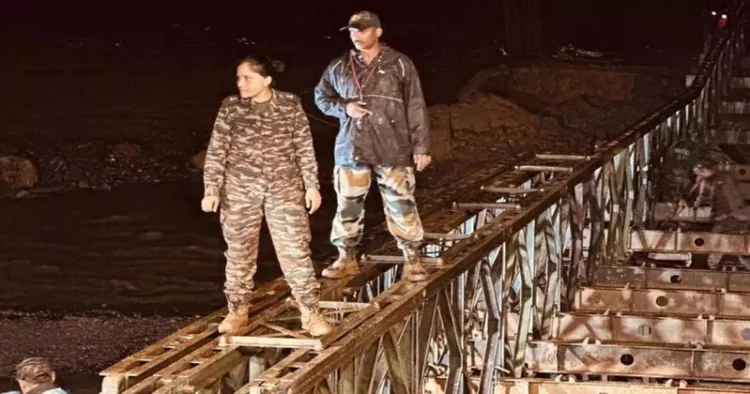In a remarkable display of leadership, Major Sita Shelke, a distinguished woman army engineer, led a team of 140 army personnel in constructing a vital Bailey bridge in Wayanad, Kerala. The bridge, spanning 190 feet, was completed in an extraordinary 31 hours, offering crucial support to rescue efforts following a landslide in Mundakkai, Wayanad.
The Bailey bridge, constructed to withstand the challenges of heavy rains and floods, quickly became a lifeline for the affected area, allowing vehicles and rescue teams to access previously cut-off regions. Major Shelke’s leadership not only facilitated immediate relief but also highlighted the significant role of military engineers in disaster response and recovery.

Taking to its social media handle, the Indian Army Southern Command Pune posted on X, “Persevering and relentless, despite facing inclement weather, rising water levels and the challenges of working through the night, the Madras Engineers Group (MEG) team is inching towards completing the bridge at Chooralmala.”
According to reports, the rescue team can transport the rescue vehicles, cutters, food, and water to Mundakkai only after the bridge is completed.
Major Sita Shelke’s journey to this pivotal role is as inspiring as her achievements. Hailing from the tiny village of Gadilgav in Maharashtra, Shelke’s path to the army was shaped by determination and resilience. Despite her initial aspiration to become an IPS officer, she redirected her ambitions toward the Indian Army after struggling to find the right guidance. Her perseverance paid off as she passed the Services Selection Board (SSB) exam on her third attempt, joining the army in 2012. Graduating in Mechanical Engineering from Pravara Rural Engineering College in Ahmednagar, Shelke’s entry into the army was supported by her family, particularly her father Ashok Bikhaji Shelke, an advocate. Her training at the Officers Training Academy (OTA) in Chennai set the stage for her subsequent achievements, including her leading role in the recent rescue operation.
The story of Major Sita Shelke and her team underscores the profound impact of determination, expertise, and teamwork in overcoming adversity. Their efforts have showcased the indispensable role of the armed forces in times of crisis.
This situation highlights the Indian Army’s essential role during crises and its unwavering commitment to national service. In the past, political figures from the Congress party and the Left Democratic Front (LDF) have often questioned and criticised the Army’s effectiveness and leadership. Yet, during the recent disaster in Wayanad, the army stepped up with impressive efficiency and dedication. Despite past criticisms, this operation proves the Army’s real capability and steadfast dedication to the nation. The rapid construction of the Bailey Bridge and the ongoing rescue efforts are a testament to the Army’s vital role in disaster response. This instance clearly shows how crucial the Army is in times of emergency and underscores the importance of supporting its efforts to help and protect the country. In contrast, Telangana Chief Minister Revanth Reddy has made controversial statements questioning India’s military actions, including casting doubts on the Pulwama attack and surgical strikes. These remarks, which challenge the bravery of the Indian military and cast aspersions on India’s stance against terrorism, appear to undermine national security efforts. By giving a clean chit to Pakistan and questioning India’s actions, such statements risk providing Pakistan with leverage at international forums and detract from the critical support and recognition that India’s armed forces deserve.
After two massive landslides struck Wayanad, Kerala, on July 30 morning, causing extensive destruction, rescue operations are being intensified, political leaders are engaged in discussions, and financial aid is being mobilised for the region.
The first landslide occurred in Mundakkai, a town, and the second in Chooralmala. The massive landslides wreaked havoc in the region, damaging houses and roads, uprooting trees, and swelling water bodies, which hindered rescue operations. Relief and rescue efforts are currently underway.
The landslides in Mundakkai and Chooralmala, Wayanad, have resulted in 167 confirmed deaths, as per the Kerala Revenue Department. According to sources from the Department of Information and Public Relations (PRD) Control Room in Wayanad, 96 victims have been identified, including 77 men, 67 women, and 22 children. Post-mortem examinations have been conducted on 166 bodies and 49 body parts. A total of 75 bodies have been handed over to relatives.
Rescue personnel have brought 219 individuals to hospitals; 78 are still receiving treatment, while 142 have been moved to relief camps. In Wayanad, 73 people are hospitalised, and five in Malappuram.



















Comments